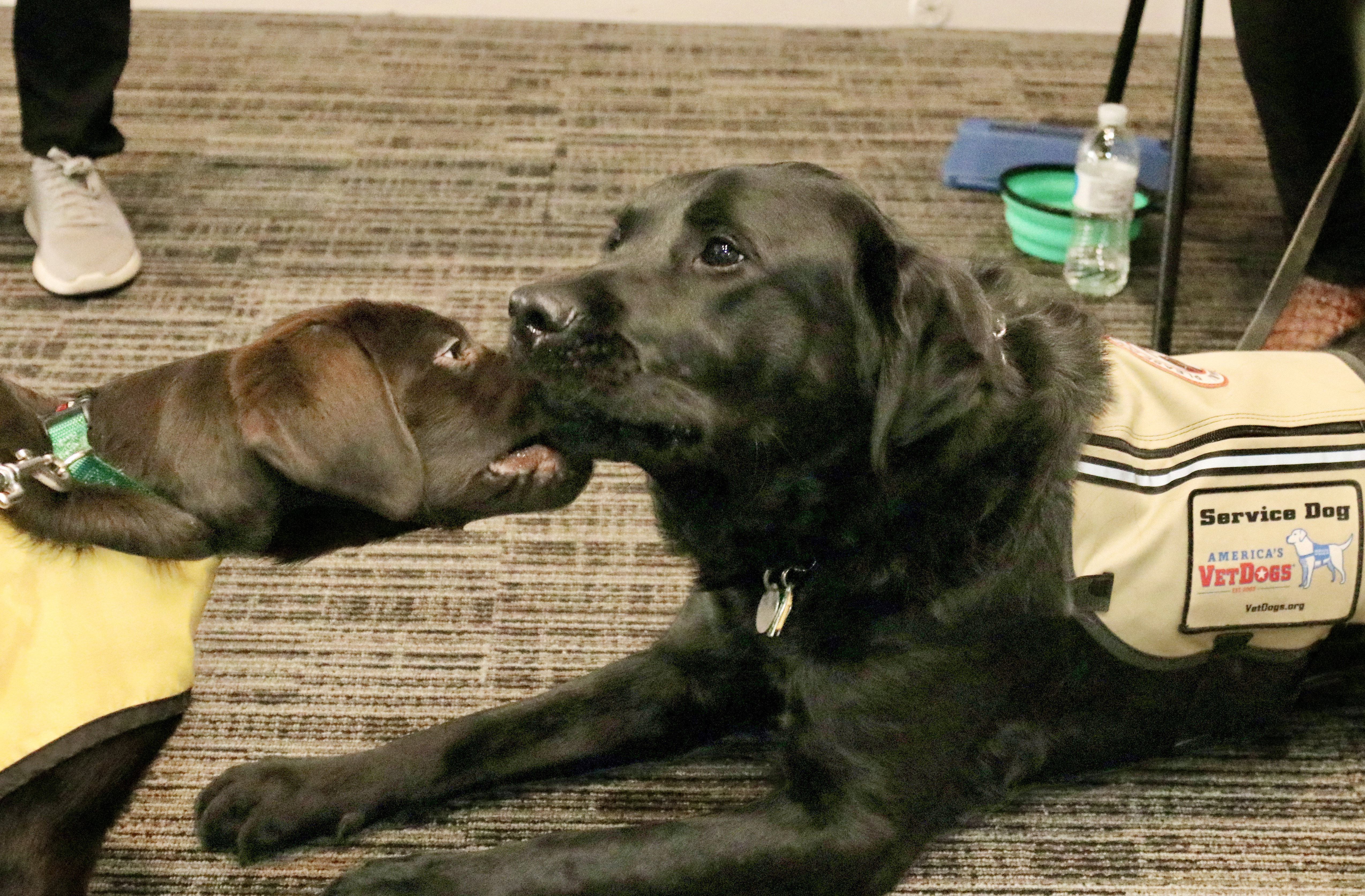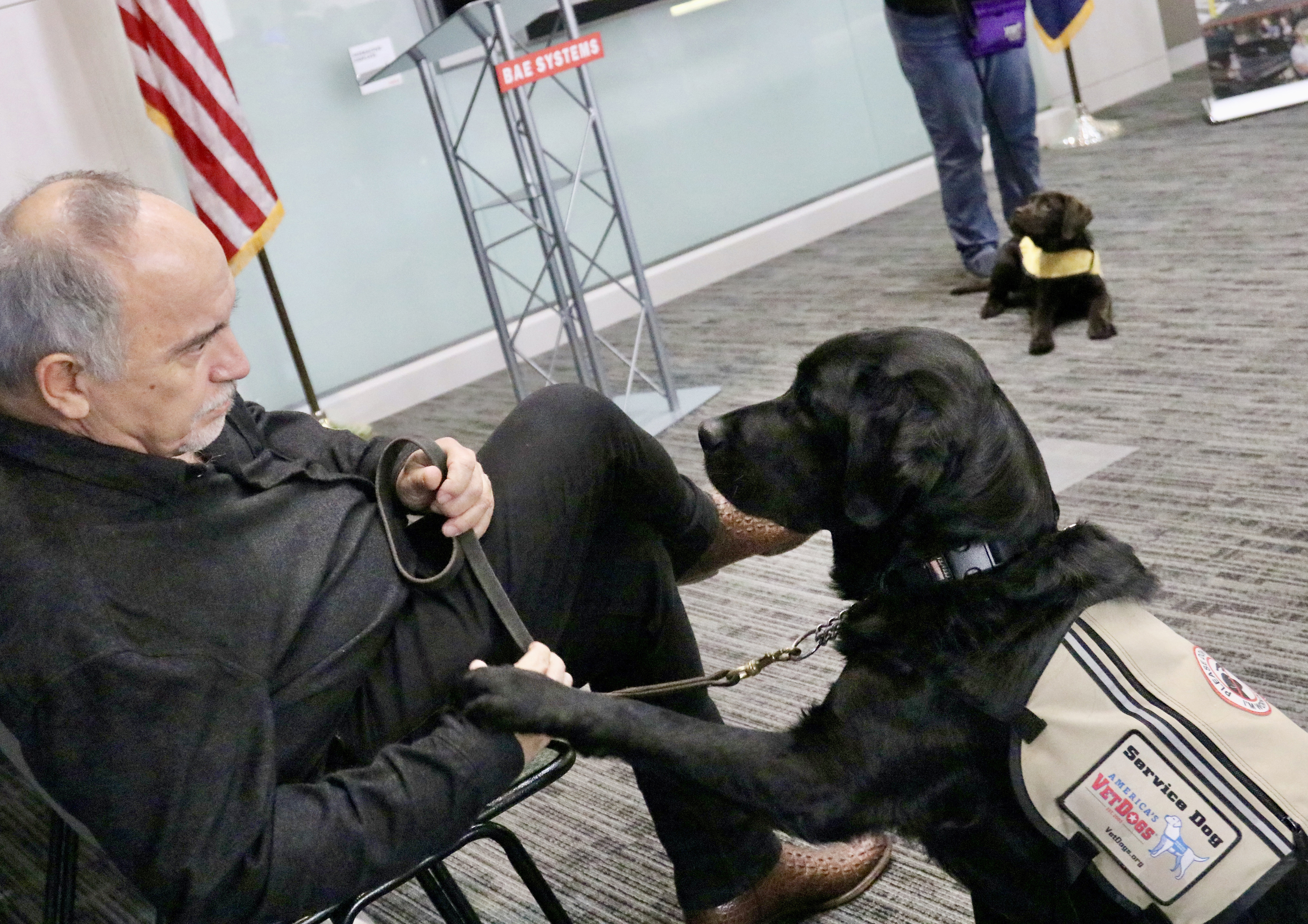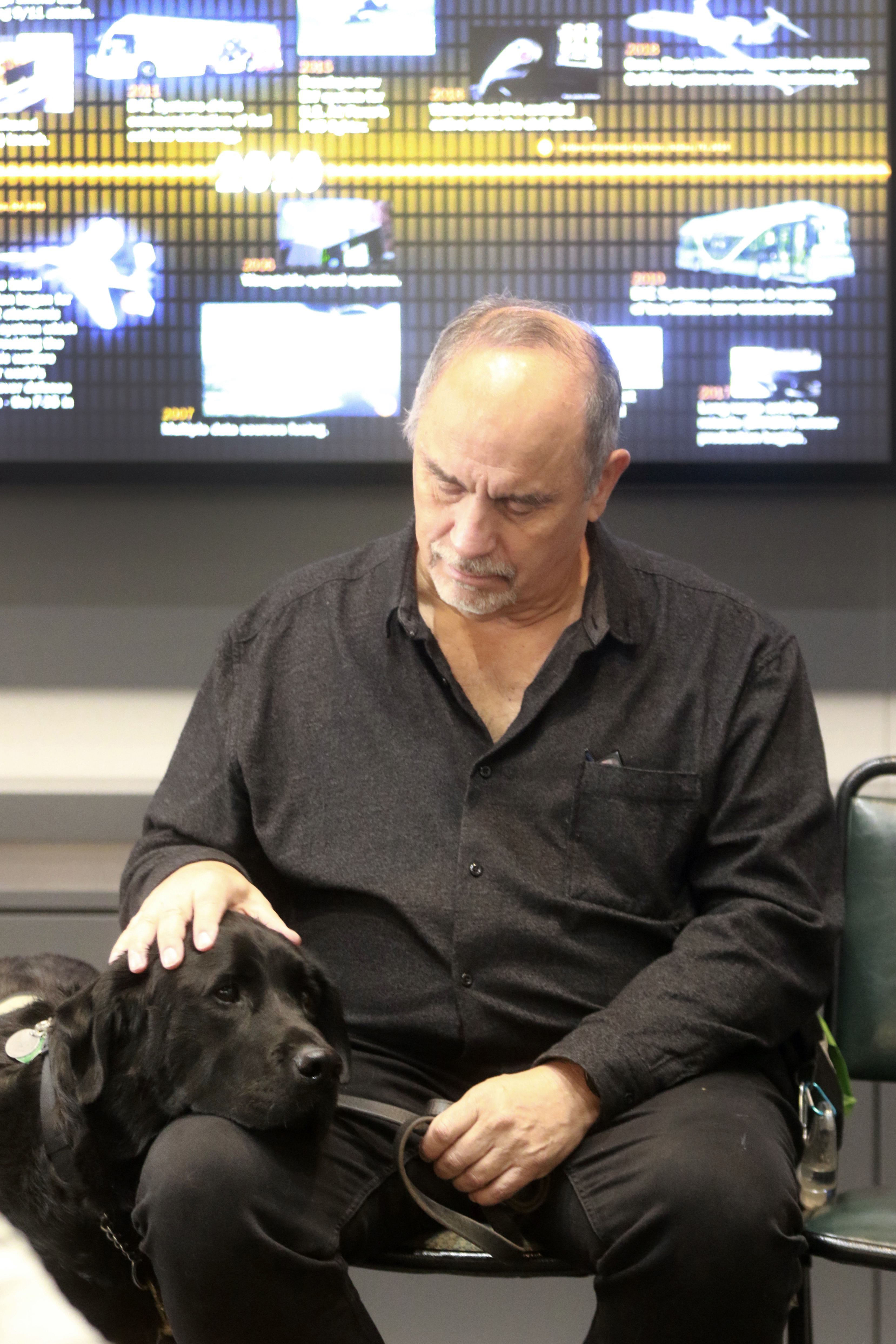CairnSurgical aims to make breast cancer surgery more precise
Lebanon company’s technology helps surgeons pinpoint size, shape of tumors

Judge, left, 3 1/2 months, and Chachi, 3, right, were two of four service dogs who visited BAE Systems in Nashua Nov. 12 with American VetDogs, which partners with the defense contractor.
Four retrievers were lolling quietly in the carpeted lobby at BAE Systems in Nashua on Nov. 12, almost unnoticeable. However, for their handlers and for veterans who need these dogs for therapeutic reasons, they communicated loud and clear and are an essential part of their work as well as a huge source of help and comfort.
BAE, a defense contractor that is the largest manufacturing employer in New Hampshire, hosted America’s VetDogs (AVD) at its South Nashua location as part of a Veteran’s Day celebration.
Representatives from AVD discussed and demonstrated how service dogs they train help reduce the physical and mental challenges veterans face after leaving the military and how they and the community can support them to reacclimate to civilian life.
AVD representatives, some of whom are from its headquarters in Smithtown, New York, on Long Island, explained how they get their dogs ready for their work helping veterans and others who need service dogs.
Paula Giardinella brought Judge, a 3-month-old chocolate lab puppy in training who also happily rolled around on the floor. She runs the organization’s Massachusetts prison puppy program, which is an important part of their work.
During the week, the puppies are at area prisons working and playing with inmates, and on weekends, puppies are with foster families who also work and play with them, so they get a well-rounded set of experiences in a variety of settings and they become “good, solid, sound dogs,” she said. AVD representatives also discussed opportunities to volunteer with their program, fund/donate to their programs and more.
Alex Pichler of AVD, who works with a 1-year-old black lab named Astro, demonstrated several tasks that each dog is also trained to do for all their clients. With training to help with PTSD, they do even more custom training for each veteran’s dog.
She showed how Astro knows how to “bring,” dropped objects such as a leash, wallet or phone; “center,” where Astro puts himself between a situation and Pichler to act as a buffer, and “turn” so that Astro’s head is turned to keep an eye on what’s happening behind Pichler. The dogs also get trained to “rest,” and also have special nightmare training to first nudge their owner’s leg and then their body in order to wake them from a bad dream.

Veteran Chris Adamchek of Carlisle, Mass., spoke of how critical to his recovery having a dog is, after 50 years of trauma from his police officer job in the 1970s, then serving in the military. He said he didn’t know he had PTSD all these years, but it heavily compromised his independence, and he noticed he couldn’t do all the same things others were doing. He said he asked for help for years, not knowing what was wrong, finally got tested for PTSD and was able to get help at a center in Boston.
With his black lab, Chachi, 3, who he finally was paired with just about a year ago, he could consider going outside again more comfortably, speak in front of the gathered group like those at BAE, feel good about people laughing at his jokes, and now can even consider working again in the future back in his law practice.
“Chachi has changed my life,” he said. “I feel great right now.” Chachi helped him immensely with this journey of healing, he said, and Chachi “helps me see the joy now …” He has worked as a police officer and as a lawyer, both professions he joked often don’t get a lot of love from people, but with his dog, now “I get nothing but smiles.”
“It’s a team that brings out the best in me,” he said of his companionship with Chachi.
Steve Brown, an Army veteran who works in business development at BAE, and who has a German shepherd, Jetta, 7, said having a service dog has so many benefits for his life as a civilian.
“It’s a comfort thing, a buffer between me and uncomfortable situations,” he said.
Brown said he is better able to be more patient, present and more understanding of others with his dog at his side. He was less able to develop relationships and be more understanding before that, he said. Having a dog by his side “helped me transition from military to civilian life.”
Brown, who lives in Center Harbor, was in the Army from 2009-2014, had deployments to Afghanistan and handled dogs while serving. He has also raised and trained dogs at home, so being around dogs is more natural and normal for him in his life, even though training working dogs is different than training service dogs.
He said he has donated two dogs he raised to law enforcement and three to veterans. He can work remotely now, but brings his dog once in a while to the office. He tries to be mindful with the dog at work. He wouldn’t bring a dog into certain areas at BAE, for example, such as the factory floor, where production areas need to be clean and free of dog fur, he said.

Veteran Chris Adamchek of Carlisle, Mass., and his service dog Chachi, 3, visited BAE Systems in Nashua Nov. 12 as part of a presentation with American VetDogs.
At BAE, where Brown has been working for over 10 years, he has developed a special K9 camera to see from a dog’s point of view, which he has a patent for. With the Innovating for Impact program, where college students are working with BAE engineers, he is collaborating to create a device for dogs to wear in their vests to communicate more discreetly with their owners and to help detect and prevent PTSD symptoms before they begin.
BAE and Brown have collaborated for five years now with America’s VetDogs through its Innovating for Impact program. This work reflects BAE Systems’ mission to “protect those who protect us.” Brown also enjoys the mentorship it allows, he said, and his experiences in training and raising dogs also lined up well with this program.
Alice Crutcher, of BAE Systems Community Investment, said the Innovating for Impact program is great for their mission.
“BAE Systems’ Innovating for Impact program activates our key business missions: ‘We Protect Those Who Protect Us’ and ‘We Innovate for Those Who Move the World,’” Crutcher said. “Working with America’s VetDogs on this program allows our employees to volunteer their time and skills to develop new technologies to improve the lives of veterans in our communities nationwide.”
Brown said at least two BAE employees are working with dogs, and about 18% of BAE Systems’ employees are veterans.
BAE Systems Director of Community Investment Amy Sweeney also praises the AVD program they partner with and how their employees also benefit.
“We provide opportunities year-round for our employees to lend their time, treasure and talent to nonprofits we fund through charitable giving that align with our key business missions, including protecting and honoring our service members, veterans and their families,” Sweeney said.
“Events like this one with America’s VetDogs give our employees a chance to understand firsthand how their efforts make true social impact on our nation’s military, veterans and their families,” she said. “In turn, the efforts engender a sense of pride and camaraderie among our employees and builds our culture.”
Brown said he has also noticed it just makes people happy to see dogs around in the workplace, too, which is always a good thing.
Learn more about America’s VetDogs, what it does, who it serves and how to help them with their mission: vetdogs.org